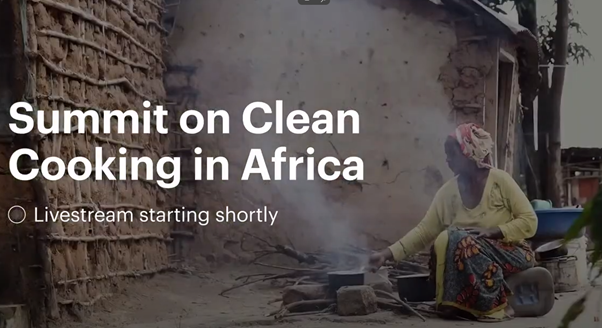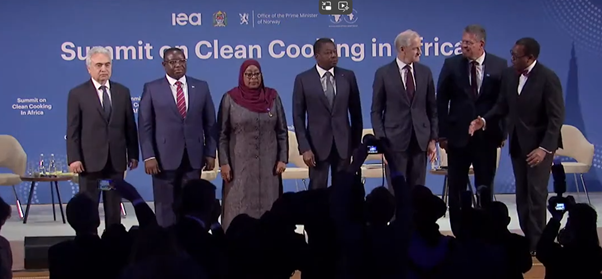
- Date
- 15th May 2024
- Categories
- Clean Cooking, IEA Summit
By Dr Simon Batchelor (Gamos Ltd.) Loughborough University
A partnership led by the IEA convened the largest gathering of international stakeholders (1000+) devoted to the issue of clean cooking, in Paris on 14th May. The day was reported to have announced $2.2 billion of new funding for the issue, and it was great to see clean cooking elevated in multiple 4 minute interventions by Presidents, Ministers and high level international players. In this blog I point to some of the things I noticed – it is by no means a comprehensive summary.
MECS sent a team to Paris and had some really good discussions but unlike COP28, we were not on the main stage in person. However, we are pleased to say that we did contribute in many ways. Not least, the UK announcement of £8.5 million for Tanzania and Uganda by Lord Benyon (3 mins) which is the MECS demonstrator funding, a part of the Ayrton Fund.
One of our stronger contributions was highlighted by the Netherlands, in the speech by Prince Jaime de Bourbon de Parme (1 min) just before Lord Benyon. He noted that there was a need for innovation, and that “four years ago electric cooking was not part of the spectrum (of choices), right now it is”. Perhaps one of the most direct shout outs to eCooking came from Stanlake Samkange of the WFP in the afternoon who we work with (4 mins). And of course, we work with the World Bank and the ESMAP Clean Cooking Fund is very much a part of MECS. Franz Dree-Gross laid out how the CCF leveraged other WB lending and Private sector funding (3 mins), and how the WB has upgraded its commitments to electricity access and is very intentionally doing integrated energy planning, so it includes electric cooking.
However, this gathering is about a multi fuel mix. MECS is sometimes put in the box of ‘only eCooking’ but that’s not the case. We support multiple approaches to solve the issue of cooking with polluting fuels, it’s just that our initial research showed that electric cooking was a neglected possibility. The research continues to show that leveraging the gains on electricity access makes sense, especially when, in quite a few markets, the monthly cost to the consumer is lower than charcoal and (unsubsidised) LPG.
Many of the funding announcements were made as fuel neutral, but some of the countries focused on the opportunity LPG seems to offer. LPG is spoken of as a transition fuel, so President Samia Suluhu Hassan of Tanzania (3 mins) and Ruth Nankabirwa Ssentamu of Uganda (4 min) both want to increase LPG use (although the Minister Ruth did point to their innovative eCooking electricity tariff). There was a financial announcement by Patrick Pouyanne of TotalEnergies (an oil and gas company) to support clean cooking by increasing LPG (3 min). What I found interesting in his announcement was that he said some of those funds will be needed to make ‘LPG more affordable’. Russel Harvey of Vitol said a similar thing (3 min) – having acquired LPG infrastructure in 12 countries reaching 10 million households, although they also do biomass ICS and invest in renewable energy technology. Likewise, there were announcements like the Sahara group which was about building LPG infrastructure for $100m (1 min). Infrastructure is a key element of service provision, and what attracts us to eCooking is that the infrastructure, the generation, transmission and distribution, is an integral part of the modern economy. Indeed Africa has spent tens of billions each year, generating, maintaining and improving the access to electricity across the continent.
Some speakers said we should learn from Brazil, India, Indonesia about how they were able to get widespread scaled use of LPG. We agree, we do need to learn from those countries. In my mind there are some takeaways from researching each – from Brazil and India, it took several decades to get that scaled uptake, starting with general subsidies and then moving to targeted subsidies. For India, that meant spending $8 billion a year in the early days on general oil and gas subsidies, which seems to have been reduced to $2 billion, but over 2 decades. Reduced GST (VAT) on LPG, mentioned by some of the speakers, was also part of the Indian strategy and cost the Indian government $1.8 billion per year in lost revenue. Then in 2016 they added targeted subsidies which currently costs the government $1.4 billion annually. There was an explanation of the targeted subsidy by Praveen Mal Khanooja of India (5 mins) , and at the end there was an awkward question and answer about the first cylinder (1 min) (grants to oil companies), about identifying households and about refills. We do indeed need to take on board the lessons from that programme; if nothing else we need to note that it has not been fully accessed by poor households, who currently have an average refill of only 3 cylinders per year (while it takes about 7 cylinders to cook for a household) i.e. households are stacking LPG with biomass. Part of that is that LPG has doubled in price over the last couple of years – adopting an LPG strategy makes a country vulnerable to global pricing, and India has had to double its imported LPG even though it has domestic production. Similarly, Indonesia spends $4 billion a year subsidising, and now has a roadmap away from its reliance on LPG.
So yes, LPG gives women a clean cooking experience in the kitchen, but I worry that reliance on LPG will leave countries vulnerable to global price fluctuations. Indeed as Mary Robinson said in her talk (5 mins), COP26 called for a removal of inefficient subsidies on fossil fuels, and progress towards a just transition to a NET Zero world. LPG is indeed cleaner in terms of global emissions than three stone fired use of non-renewable biomass, so I am not suggesting it should not be part of a multi-fuel mix, but perhaps we should not lean on it too much.
There was only passing mention of LNG, but Ehouman Narcisse Kalifa of Cote d’voire (3 min) said they will use it for schools and support the general population with biogas. Biogas tends to get only passing mention, but it holds tremendous potential as referred to by Ruth Nankabirwa Ssentamu of Uganda (2 min), and brought to the foreground by Alexander Eaton of Sistema.bio (3 min).
There was an impressive pitch on Ethanol from Greg Murray Koko networks (3 min), who we have worked with. Koko said that their reach to 5 million customers was achieved in 4 years and contrasted that with Brazil’s reach of LPG.
Improved cookstoves seem to be going to scale in places. While BURN is known on these MECS pages for working with us on eCooking, they also work with Tier 3 stoves and employ 3500 people in their factories. Peter Scott of BURN (4 min) talked about how much carbon finance they have accessed and pointed to their intention to start factories in Malawi, DRC and Ghana. With carbon finance they are making the $40 stoves available at $2.

So, taking a step back from a fuel based commentary, let us return for a moment to finance. Carbon finance was mentioned several times, and indeed it holds great promise as our carbon pages suggest. 2024 has been a turbulent year for carbon, with the Berkeley paper pointing to the over-claiming and the price dropping from about $9 per tonne to about $4 due to a loss of trust in the accuracy of claims. Nevertheless BURN noted that even at low carbon pricing for improved cookstoves they could make it work, and Jules Kortenhorst of CQuest Capital spoke about how they need to rebuild trust within carbon markets. We note that many of our partners are accessing carbon for eCooking (at premium prices because the use is measured and verified by the metered methodology we developed with Climate Impact Partners and Gold Standard, and which is now being picked up by VERRA and the 4C working group). Of course BURN mentioned above are also doing eCooking appliances using the new metered methodology, as are early movers ATEC, UpEnergy and Powerup. ATEC have been particularly focused on getting the carbon finance to the user and I note that 100 organisations led by CCA used the summit to launch some Principles for Responsible Carbon Finance in Clean Cooking. It was also interesting to hear an alternative perspective on carbon from Stephanie Mbombo of the DRC (3 min).
Simon Stiell of the UNFCCC drew attention to the comparison with the airline industry. (5 min). Biomass based cooking generates about 2% of global emissions, about the same as the airline industry. Building on this Shrikant Madhav Vaiyda of India pointed out that the airline industry had now pledged to spend $179.5 billion each year to get to a Net Zero position by 2050. This contrasts with the ask for $4 billion by 2030 to save an equivalent amount of emissions in clean cooking.
As stated elsewhere, there was a soft launch of a report jointly written by the AFREC, part of the AU, and MECS. Amani Abou-Zeid of the African Union (3 min) focused on the economic consequences of clean cooking. Certainly, we need to remove the costs of inaction ($791 billion) to boost the economy, but we also need to use that ‘just transition’ to strengthen the wider economy with associated productivity. This is a key headline from our joint report. After the panel, host Kevin Kariuki of the AFDB noted that the first project of their 20% on clean cooking1 would be eCooking in Kenya (1 min), and Ms Abou-Zeid made a second short intervention on “African value chains for Africa” (30 seconds).
Steven Singer of Climate Action Network gave an impassioned talk (5 mins) about his multi stakeholder network and he made some interesting points:- that the Netherlands has deployed more solar technologies than all of Africa, he talked about oil and wealth tax ($25 billion) and that the least developed countries will pay $400 billion this year in debt repayments!
So finally let me return not to the details but to celebrating the concept behind the summit. Elevating clean cooking to a politically high level issue, so much so that the G7, G20, COP29 will all be making statements and planning for clean cooking (1 min) – brilliant. Thank you Fatih Birol. Getting people to announce funding to the tune of $2.2 billion for this issue. (1 min) Thank you Fatih Birol. And for getting people to network and do ‘deals’, excellent. Thank you Fatih Birol. “A little less conversation, a little more action” Thank you Elvis Presley.2
***************************************************************************************************************
1AfDB pledged to spend 20% of their energy funding on clean cooking at COP28. That’s about $2 billion over next ten years.
2Fatih was called Elvis by two people to highlight the idea we needed less conversation and more action!
Postscript: Lydwine Baradahine of Burundi explained some health impacts that I have to admit I was not aware of. She told how studies had shown that indoor air pollution not only affects the cook directly, but reduces the efficacy of mosquito nets.
Featured Image Credit: snapshot of IEA ‘live stream about to start’ video, IEA, 2024, used by Fair Use Act.